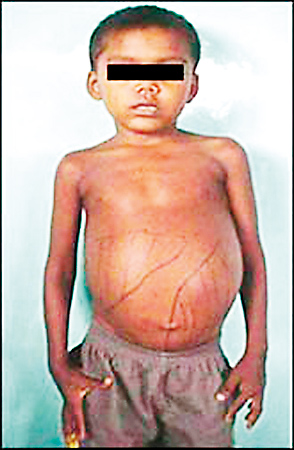Not an uncommon problem: Thalassaemia in Sri Lanka
Thalassaemia is not necessarily a household word to many people in Sri Lanka. But this disease is, in fact, an important health problem in this country.
Thalassaemia is an inherited (genetic) blood disorder, occurring throughout the island, in which haemoglobin, the main protein (oxygen carrier) of the red blood cell, is not produced in sufficient quantities.

Give a helping hand to children affected by the disease
Although babies affected by thalassaemia are apparently healthy at birth, severe life-threatening anaemia becomes apparent at the age of about six months.
Thereafter, most (though not all) children, require monthly blood transfusions. In most children, without transfusion, death occurs in the first few years of life.
While treating one problem, the anaemia or “low blood” of thalassaemia, blood transfusions also result in iron accumulation within vital organs, including the heart and liver.
If this iron overload is not treated, it leads to premature death in the teenage years. But with expert dedicated care and effective treatment, most children can look forward to healthier lives.
With adequate transfusion, in parallel with administration of effective drugs called “iron-chelating” agents, many children grow and develop, and survive into adult life.
The Health Ministry spends 5% of its annual budget for procuring chelating agents. However, better treatments are urgently needed.
In many richer countries, including the United States of America, thalassaemia is identified as an “orphan disease” — one by which fewer than 1,000 patients in the country are affected.
Partly related to this low frequency, there is relatively little interest in supporting research and care for thalassaemia in many resource-rich countries.
But thalassaemia, along with sickle cell anaemia one of the two most common single gene disorders worldwide, imposes a huge burden of disease: Approximately 7% of the world’s population is a carrier for one of these two diseases, and it is estimated that 300,000-500,000 affected babies are born each year.
Thousands of children affected with thalassaemia receive medical care throughout every area of Sri Lanka.
Over the last 10 years, work conducted in screening programmes supported by the Health Ministry, has helped to increase public awareness on thalassaemia. Still, awareness needs to be expanded, while management remains complicated, even in resource-rich countries.
In emerging countries, there are more challenges to achieving optimal care.
| Providing care to children and adults Hemoglobal®, a charity founded and directed by Sir David Weatherall and Dr Nancy Olivieri, has dedicated itself to improving care for children with thalassaemia in Sri Lanka. Since 1995, they have worked closely with the country’s dedicated pediatricians, including Prof. Sanath Lamabadusuriya, to improve the health of children with thalassaemia. In 2001, the National Thalassaemia Centre, the largest for thalassaemia in the country, was established adjacent to the Kurunegala General Hospital and since that time, dedicated health care workers, some supported by Hemoglobal®, provide care here to hundreds of children and adults. There are other centres for thalassaemia in Kelaniya (Ragama), Anuradhapura, Badulla and at the Lady Ridgeway Hospital for Children in Colombo. Other hospitals throughout Sri Lanka treat a lesser number of children with thalassaemia. More recently, several individuals, including celebrated Sri Lankan-Canadian writers Michael Ondaatje and Shyam Selvadurai, have supported Hemoglobal®. But there is much more work to be done. Prof. Weatherall, Dr. Olivieri and their research and clinical teams continue to visit Sri Lanka several times a year, working with their colleagues around the island, assisted by the Director General of Health Services, Dr. Palitha Mahipala to optimise treatment for thalassaemia. Donations to Hemoglobal® are used to support these studies and this clinical care that helps to improve the lives of these children. The public’s support will continue to help Hemoglobal® build a better future for children with thalassaemia – one child at a time. |
(Sir David Weatherall is Regius Professor of Medicine, Emeritus, University of Oxford, UK; Dr. Nancy Olivieri is Professor of Medicine, Paediatrics and Public Health Sciences, University of Toronto, Canada; & Prof. Sanath P. Lamabadusuriya is Emeritus Professor of Paediatrics and former Dean, Faculty of Medicine, University of Colombo)


